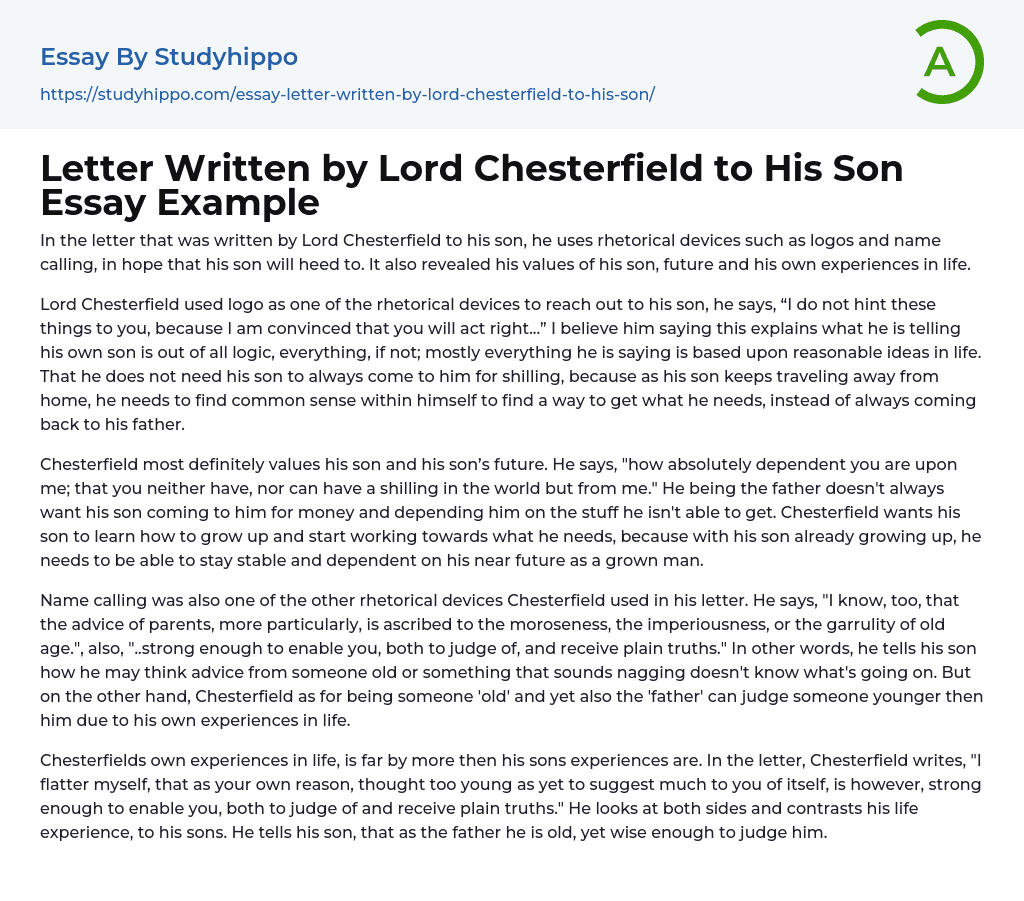

Letter Written by Lord Chesterfield to His Son Essay Example
Lord Chesterfield's letter to his son utilizes rhetorical tools including logos and name-calling in order to instill certain principles in him. The letter provides insight into his aspirations for his son's future as well as his own life experiences.
In his communication with his son, Lord Chesterfield employed the rhetorical tactic of logos. In his words, "I do not hint these things to you, because I am convinced that you will act right..." Chesterfield’s emphasis seems to be that he is trying to convey rational and pragmatic advice to his offspring. His expectation is not for his son to constantly lean on him for financial help, but rather to grow in wisdom and self-reliance. As the son journeys farther from home, it becomes necessary for him to develop practical sense and figure out how to meet his own needs
..., instead of perpetually depending on his father.
Without a doubt, Chesterfield highly appreciates his son and is invested in his son's future. He communicates, "your financial situation is entirely reliant on me, you don't possess or can't possess a penny in this world except it's from me". As a father, Chesterfield doesn't always expect his son to rely on him for financial support and his needs that he can't fulfil on his own. He desires for his son to mature and begin striving for his needs, given that as his son gets older, he needs to maintain stability and financial independence in his imminent future as an adult.
Chesterfield leveraged the rhetorical tool of name-calling in his letter as well. He stated, "I am aware that parental advice is often attributed to the sulkiness, dominance, or chattering o
advancing years." Further, he also says, "you're adequately equipped to appraise and grasp undeniable truths." Chesterfield implies that his son may disregard the counsel from an elderly person or perceive it as a rant originating from unawareness. However, Chesterfield, despite being 'old' himself and also being a 'father', possesses the capability to form a judgment about his junior, courtesy of his life experiences.
Chesterfield's personal life encounters surpass those of his son significantly. He communicates this sentiment in his letter where he states, "I pride myself on the belief that your inherent logic, though still nascent to present much from your side, is however, robust enough to assess and acknowledge indisputable facts." There is a comparative analysis between his experiences and his son's from Chesterfield's perspective. He informs his son that his age might be advanced, but it also equips him with the wisdom essential to make judgments.
- Common sense essays
- Adam And Eve essays
- Baptism essays
- Catholic Church essays
- Christian essays
- Church essays
- Crucifixion Of Jesus essays
- Crusades essays
- Elizabeth essays
- Eucharist essays
- God The Father essays
- Holy Spirit essays
- Jesus Christ essays
- Lord essays
- Pope essays
- Priest essays
- Protestant Reformation essays
- Protestantism essays
- Sacrament essays
- American Literature essays
- Between The World and Me essays
- Book Report essays
- Book Review essays
- Book Summary essays
- Books essays
- Character essays
- Coming of Age essays
- Dante's Inferno essays
- Everyday Use essays
- Flowers for Algernon essays
- Genre essays
- Greek Mythology essays
- Incidents in The Life of a Slave Girl essays
- Letter essays
- Literary Criticism essays
- Literary devices essays
- Literature Review essays
- Metaphor essays
- Myth essays
- Play essays
- Plot essays
- Poem essays
- Poetry Analysis essays
- Protagonist essays
- Reader essays
- Reason essays
- Rhetoric essays
- Rhetorical Question essays
- Rhyme essays
- Simile essays



